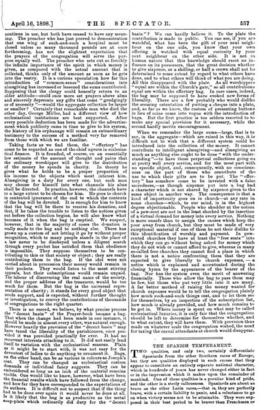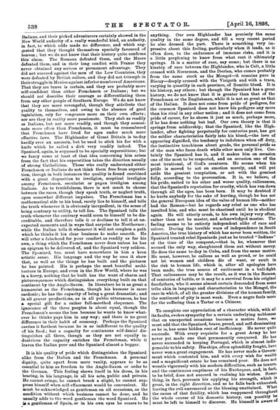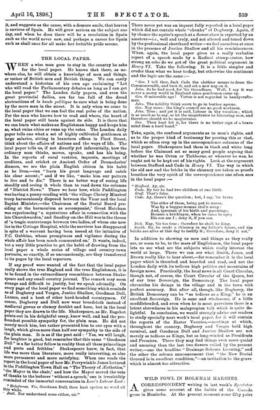THE SPANISH TEMPERAMENT. T WO qualities, and only two, certainly differentiate
Spaniards from the other Southern races of Europe, but they are qualities displayed in such excess that they appear to constitute an entirely separate national character, which in hundreds of years has never changed either in fact or in the impression which it makes upon the remainder of mankind. One of these qualities is a peculiar kind of pride, and the other is a steely callousness. Spaniards are about as brave as the other Latin races,—that is, they are perfectly brave, with a certain liability to panic, and a reluctance to go on when victory seems not to be attainable. They were sup- posed in their best period to be braver than Frenchmen or
Italians, and their picked adventurers certainly showed in the New World audacity of a really wonderful kind, an audacity, in fact, to which odds made no difference, and which sug- gested that they thought themselves specially favoured of heaven ; but we do not know that their history quite confirms this claim. The Romans defeated them, and the Moors defeated them, and in their long conflict with France they never obtained any serious or permanent advantage. They did not succeed against the men of the Low Countries, they were defeated by British sailors, and they did not triumph in their struggle in Mexico against inferior numbers of Americans.
That they are brave is certain, and they are probably more self-confident than either Frenchmen or Italians ; but we should not describe their courage as differentiating them from any other people of Southern Europe. We do not know that they are more revengeful, though they attribute that quality to themselves, and owing to the absence of good legislation, rely for vengeance more on their own efforts ; sor are they in reality more passionate. They stab as readily is Italians, but not more readily, and though they assassi- nate more often than Frenchmen, it must be remembered that Frenchmen have lived for ages under much more effective laws. The Highlander of Great Britain is to-day hardly ever an assassin, but be used to stick his foe with a knife which he called a dirk very readily indeed. The Spaniard, again, is supposed to be specially superstitions; but we fancy some at least of that idea concerning him arises from the fact that his superstition takes the direction usually of strong Catholicism. Those who really understand either Frenchmen or Italians do not think them free from supersti- tion, though in both instances the quality is found combined with a great disposition to irreligion, sceptical irreligion among Frenchmen, secularist or pagan irreligion among Italians. As to truthfulness, there is not much to choose between the races, though they speak truth, or neglect truth, upon somewhat different impulses. The Frenchman has a mathematical side to his head, rarely lies to himself, and tells the truth whenever it is obviously inexpedient, in the sense of being contrary to utility, to tell lies. The Spaniard tells the truth whenever the contrary would seem to himself to be dis- creditable, and therefore tells it or declines to tell it at un- expected moments and in ways that surprise the Northerner; while the Italian tells it whenever it will not roughen a path which he thinks it his clear business to make smooth. He will utter a falsehood for your comfort as readily as for his own, a thing which the Frenchman never does unless he has an epigram to be delivered of, and the Spaniard very seldom. The Spaniard, too, must have somewhere in him a keen artistic sense. His language and the way he uses it 'show that, as well as the things he has built and the pictures he has painted. His is perhaps the most beautful archi- tecture in Europe, and even in the New World, where he was in a hurry, nothing that he built has the want of charm and picturesqueness which distinguishes everything built on that continent by the Anglo-Saxon. In literature he is as great a humonrist as the Frenchman, though his humour is more sardonic ; he has the capacity of being a great dramatist ; and in all graver productions, as in all public utterances, he has a special gift for a rather full-mouthed eloquence. The ignorance of the three peoples is about equal, though the Frenchman's seems the less because he wants to know what- ever he thinks pays him in any way ; and there is no great difference in their habit of economy. Perhaps the Spaniard carries it farthest because he is so indifferent to the quality of his food ; but a capacity for continuous self-denial dis- tinguishes all three, though as they are not equally in- dustrious the capacity enriches the Frenchman, while it leaves the Italian poor and the Spaniard almost a beggar.
It is his quality of pride which distinguishes the Spaniard alike from the Italian and the Frenchman. A personal dignity, quite apart from mere vanity, appears to be as essential to him as freedom to the Anglo-Saxon or order to the German. This feeling shows itself in his dress, in his bearing, in his language, in all his acts, public and private. He cannot cringe, he cannot brook a slight, he cannot sup- press himself when self-effacement would be convenient. He must be acknowledged as gentleman on all occasions, as the condition without which business cannot be done, and he usually adds to the word gentleman the word Spaniard. He 1,0 a gentleman of Spain, or in his own eyes he ceases to be anything. Our own Highlander has precisely the same quality in the same degree, and till a very recent period he also dressed the part. There is something very im- pressive about this feeling, particularly when it leads, as it often does, to the endurance of immense risks, and it is a little perplexing to know from what root it ultimately springs. It is a matter of race, say some; but there is no kinship of race between the Highlander, who is Celt, a little crossed with Norseman, and the Iberian, who comes probably from the same stock as the Mongol—it remains pure in Biscay—deeply crossed with the Visigoth and with a trace, varying in quantity in each province, of Semitic blood. It is his history, say others; but though the Spaniard has a great history, we do not know that it is greater than that of the Frenchman or the Englishman, while it is not so great as that of the Italian. It does not come from pride of pedigree, for the common Spaniard does not know his pedigree any more than his rival in any other nation ; and it does not come from pride of career, for he shows it just as much, perhaps more, if he has done nothing but loaf. Our own theory is that it springs from soldiership; that the Spaniard, like the High- lander, after fighting perpetually for centuries past, has got the soldier characteristics fairly into his blood,—the love of appearing dignified, the tendency to indolence when off duty, the instinctive touchiness about grade, the personal pride as of the man who faces death while other men only live. Cer- tainly the Spaniard has it, and it makes him on occasion one of the most to be respected, and on occasion one of the most irrational, of God's creatures. He seems when his pride is moved to act on emotion merely, and will put aside the greatest temptation, or act with the greatest folly, according to the provocation. It is, we believe, of his pride, united to his other and worse quality, callousness, that the Spaniard's reputation for cruelty, which has ran down through all the ages, has been born. It may be doubted if he hurts anybody for the sake of hurting, though he has not the general European idea of the value of human life—neither had the Roman—but he regards any rebel as one who has insulted him, and who mast be chastised until he is obedient again. He will utterly crush, to his own injury very often, rather than not be master, and acknowledged master. The feeling seems to be entirely independent alike of race and colour. During the terrible wars of independence in South America, the true history of which has never been written, the Spaniard treated rebel Spaniards just as he treated "Indians" at the time of the conquest,—that is, he, whenever that seemed the only way, slaughtered them out without mercy. He does the same to-day in Cuba, and from the same motive. He must, however, be callous as well as proud, or he could not let women and children die of want, or exult in the risk to human life, which is, after all apologies have been made, the true source of excitement in a bull-fight. That callousness may be the result, as it was in the Roman, of centuries of battle, or it may be a survival from his original forefathers, who it seems almost certain descended from some tribe akin in language and characteristics to the Mongol, the race in which, of all the greater divisions of the human family, the sentiment of pity is most weak. Even a negro feels more for the suffering than a Tartar or a Chinese.
To complete our appreciation of a character which, with all its faults, evokes sympathy for a certain underlying nobleness that on unexpected occasions becomes a motive force, we must add that the Spaniard, brave, proud, and self-dominating as he is, has some hidden root of inefficiency. He never quite succeeds. With every requisite for a great Army he has never yet made one that permanently conquered. He has never succeeded in keeping Portugal, which is almost indis- pensable to his safety. His ships, often splendidly fought, have never won a great engagement. He has never made a Govern- ment which contented him, and with every wish for wealth and a magnificent estate he has remained poor. He does not wrestle vigorously with his modern difficulties, such as tenure, and the continuous emptiness of his Exchequer, and, in fact, to be brief, does not succeed in realising his wishes. Some- thing, in fact, prevents his applying his strength, which is great, in the right direction, and so he falls back exhausted, leaving the evil unremoved or the blessing unattained. What the cause of that futility, which has reappeared throughout the whole course of his domestic history, can possibly be must be left to himself to discover. He himself is aware of
it, and suggests as the cause, with a demure smile, that heaven is envious of Spain. He will grow serious on the subject one day, and when he does there will be a revolution in Spain such as the world never saw, and perhaps a career for Spain such as shall once for all make her irritable pride serene.




































 Previous page
Previous page